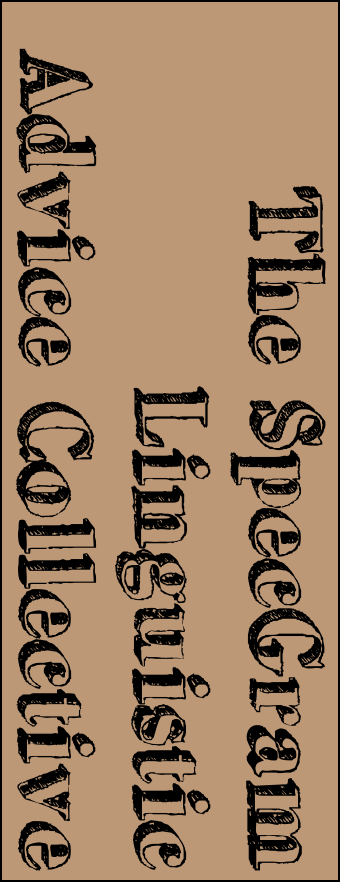


Are you in a world of linguistic hurt? The SpecGram Linguistic Advice Collective (SLAC) will offer you empirical, empathic, emphatic advice you can use!*

Remember, if you can tell the difference between good advice and bad advice, then you don’t need advice! So, if you need advice, trust us
Dear Collective,
I have built up a successful career as a philosopher of linguistics, focusing on the nature of meaning and the meaning of nature. One of my papers was even cited once. However, I am being increasingly lured into work on computational linguistics, despite have no knowledge of computing or maths.
My theorist colleagues are accusing me of being wooed by “the dark side”. My field researcher colleagues say that I’m on that side already.
Should I make the career change? Do I need to learn about computers? Will computational linguistics accept my habit of pontificating on the basis of a nebulous idea?
Yours,
—Allan (Al) Et
Dear Alien,
If computational linguistics is turning to the Dark Side, you should look at the field of Sentiment Analysis
—SLAC Unit #50657465
Dear Al,
You mustn’t let their false concern, which if allowed to continue will result in your being sent on permanent unpaid sabbatical “for your own good,” steer you away from what must be done. Whenever their doubt and concern becomes too overbearing, simply repeat the mantra, “Dark matter? Never mind! Dark mind? Doesn’t matter!” And be sure to save some of the cookies for us
—SLAC Unit #4d696b61656c
Dear Al Ian,
Yes, make the change. We recommend that you take an undergraduate-
The content of your research program, and its reception by sogenannte “experts”, are largely irrelevant to the level of reward which you will receive. Computational methods are most deeply satisfying to those of their practitioners who don’t actually understand the tools, but who think they do.
—SLAC Unit #4b65697468
Dear Ethel,
What the others haven’t mentioned is the difference in equipment needed for each career. While a comp linguist needs a computer, some paper and a wastebasket and a theoretician doesn’t need the computer, it is known that linguistic philosophers don’t even need the wastebasket. Consider that when you fill in your next grant application.
—SLAC Unit #4a6f6e617468616e
Dear Allan Deviation,
“Nebulous” derives from a Latin word meaning “cloud”, which is all the rage these days in computing. Keep using words like that and you’ll surely get a stable and lucrative job offer (and a great view of a mountain) from Abjad Inc.
By the way, congratulations on achieving an h-index of one! What’s that like?
—SLAC Unit #56696e63656e74
Dear @El,
I am somewhat disturbed by your pluralization of maths, though, yes, you would probably have to master several of them to be good at computational linguistics
You mention a habit of pontificating on the basis of nebulous ideas, so maybe computational linguistics isn’t really right for you. Unlike “real” linguistics, you have to tell a computer exactly what you want it to do, and how to do each step. There’s none of that squishy “just do the obvious right thing here” that syntacticians are fond of. Maybe you are really meant to be in management
—SLAC Unit #54726579
* Advice is not guaranteed to be useful, practical, or even possible. Do not attempt at home. Consult a doctor (of linguistics, philology, or